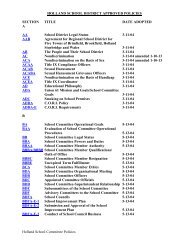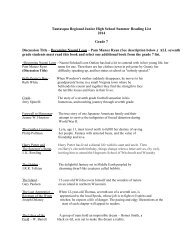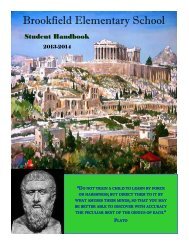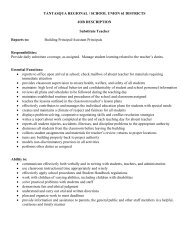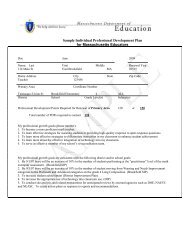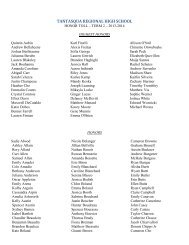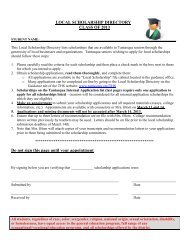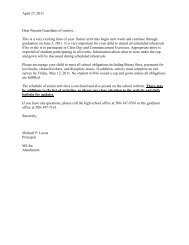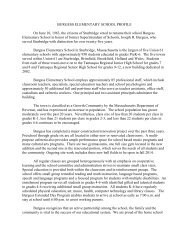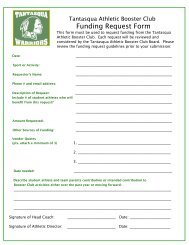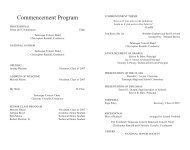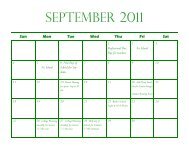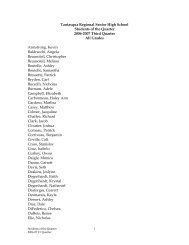AP Language and Composition - Tantasqua.org
AP Language and Composition - Tantasqua.org
AP Language and Composition - Tantasqua.org
You also want an ePaper? Increase the reach of your titles
YUMPU automatically turns print PDFs into web optimized ePapers that Google loves.
We will write three argument papers, one personal, <strong>and</strong> shorter pieces of argumentation. We begin the<br />
course with argument, as it is the mode most suitable to identifying the nature <strong>and</strong> specifics of the<br />
rhetorical process.<br />
• write for a variety of purposes : see assignments list<br />
• produce expository, analytical, <strong>and</strong> argumentative compositions that introduce a complex central<br />
idea <strong>and</strong> develop it with appropriate evidence drawn from primary <strong>and</strong>/or secondary sources, cogent<br />
explanations <strong>and</strong> clear transitions<br />
With class <strong>and</strong> teacher feedback, your writing will improve in depth <strong>and</strong> complexity. You will look for<br />
clear cues in the question or prompt to learn exactly what task you are being asked to perform. This is<br />
an extension of the nature of the “Four Modes of Rhetoric” approach.<br />
We learn both the “Macro” element of looking at one’s own work as a whole (purpose, <strong>org</strong>anization,<br />
thesis, audience) <strong>and</strong> the “Micro” level of controlling paragraphs, offering evidence, providing<br />
transitions, crafting sentences, <strong>and</strong> connecting paragraphs for lucidity.<br />
We emphasize that writing <strong>and</strong> planning in paragraphs in the central skill of the course. Examining <strong>and</strong><br />
creating richer <strong>and</strong> more unified paragraphs is the key to the improvement of writing.<br />
• demonstrate underst<strong>and</strong>ing <strong>and</strong> mastery of st<strong>and</strong>ard written English as well as stylistic maturity in<br />
their own writings:<br />
Teacher feedback <strong>and</strong> The Elements of Style are used to correct any mechanical errors as well as to<br />
begin conversations on style. Essays are kept in a folder so the teacher can have “a conversation”<br />
with <strong>and</strong> about a student’s body of work. Sentence exercises are practiced with some regularity.<br />
Vocabulary: Students will compile weekly vocabulary lists from problematic or what we call “SAT”<br />
words: the lists should number between 30 <strong>and</strong> 75. One group will have this responsibility per unit, but<br />
will run off a Vocabulary Packet for the entire class on that unit.<br />
Packets should contain a clear <strong>and</strong> user-friendly definition of the word, then offer three words from a<br />
thesaurus that are related but not identical in meaning.<br />
Students are to expect a vocabulary quiz, unannounced, a few days after the packets are produced.<br />
• demonstrate underst<strong>and</strong>ing of the conventions of citing primary <strong>and</strong> secondary sources;<br />
On a final research paper, we use Purdue’s The Owl <strong>and</strong> The Big Six (an approach to research<br />
generally, then applying the MLA method) provided by the school library,<br />
• move effectively through the stages of the writing process, with careful attention to inquiry <strong>and</strong><br />
research, drafting, revising, editing, <strong>and</strong> review<br />
Lessons, brainstorming devices, approaches to “getting it going,” peer-editing, conferencing, selfassessment,<br />
<strong>and</strong> teacher feedback are all designed to deepen your experience <strong>and</strong> expertise as a<br />
writer. You will see a paper as a finished product that emerges from an ongoing process to improve it.<br />
• write thoughtfully about their own process of composition<br />
Journal <strong>and</strong> peer response ask you to comment on your own development<br />
• revise a work to make it suitable for a different audience:<br />
We practice discourse activities that alter with an audience’s needs or knowledge base. The major<br />
paper in middle of the course addresses the issue of audience directly.<br />
• analyze image as text



